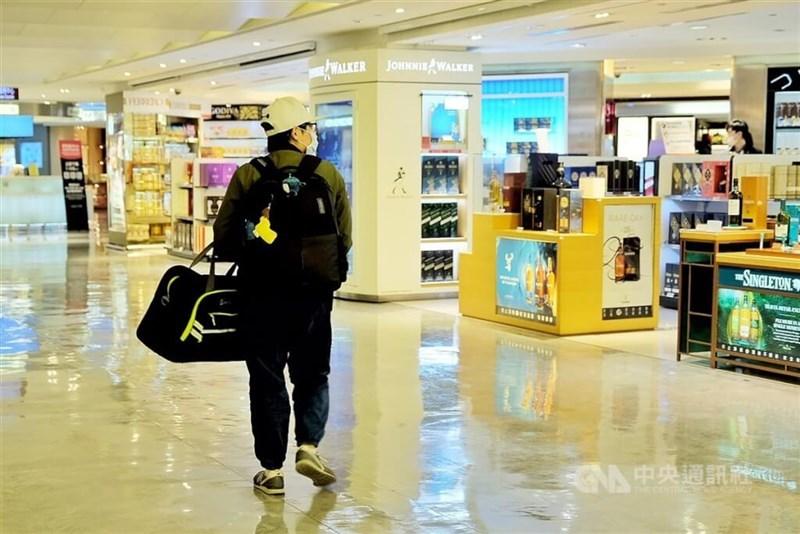The Ministry of Finance said it is planning to increase the allowance for duty-free alcohol brought into the country by travelers for their personal use from the current 1 liter to 1.5 liters.
When the regulation is changed, it would take effect in the first quarter of next year, a ministry official said recently.

Photo: CNA
Currently, the allowance for duty-free alcohol for personal use is 1 liter per incoming traveler, with no limit on the number of bottles and no requirement for customs declaration.
Passengers who exceed the duty-free limit must declare the alcohol, otherwise they risk confiscation and fines at customs, according to the current regulations.
The ministry is now planning to increase the duty-free allowance, taking into account the relevant regulations in other countries, tax implications, and opinions in Taiwan's alcohol and import industries, the official said.
According to a recent Customs Administration survey, the duty-free allowance for alcohol in Thailand, Indonesia, Hong Kong and Macau is 1 liter per inbound passenger, while in China it is 1.5 liters, and in South Korea and Singapore it is 2 liters.
In Vietnam, the duty-free limit is 1.5 to 3 liters, depending on the alcohol percentage, while Japan allows three bottles of less than 760ml each, which is about 2.28 liters in total.
In the US and Australia, the duty-free allowance for alcohol is 1 liter and 2.25 liters respectively.
The UK allows incoming travelers to bring in a maximum 42 liters of duty-free beer and 18 liters of grape wine.
If Taiwan raises its duty-free limit for alcohol to 1.5 liters, the total tariffs, business taxes, and tobacco and alcohol taxes would drop by millions of New Taiwan dollars per year, the ministry said, citing an estimate of 12 million incoming travelers annually.
The ministry official said it had been considering increasing the duty-free allowance to 2 liters, but has settled on 1.5 liters after careful evaluation of the opinions of associations in the domestic alcohol and import industries.

Eight restaurants in Taiwan yesterday secured a one-star rating from the Michelin Guide Taiwan for the first time, while three one-star restaurants from last year’s edition were promoted to two stars. Forty-three restaurants were awarded one star this year, including 34 in Taipei, five in Taichung and four in Kaohsiung. Hosu (好嶼), Chuan Ya (川雅), Sushi Kajin (鮨嘉仁), aMaze (心宴), La Vie by Thomas Buhner, Yuan Yi (元一) and Frassi in Taipei and Front House (方蒔) in Kaohsiung received a one-star rating for the first time. Hosu is known for innovative Taiwanese dishes, while Chuan Ya serves Sichuan cuisine and aMaze specializes

Taitung County is to launch charter flights to Malaysia at the end of this year, after setting up flights to Vietnam and Thailand, the Taitung County Government said yesterday. The new charter flight services, provided by low-cost carrier Batik Air Malaysia, would be part of five-day tour packages for visits to Taitung County or Malaysia. The Batik Air charter flight, with about 200 seats, would take Malaysian tourists to Taitung on Dec. 30 and then at 12:35pm return to Kuala Lumpur with Taiwanese tourists. Another charter flight would bring the Taiwanese home on Jan. 3 next year, arriving at 5:30pm, before taking the

STATS: Taiwan’s average life expectancy of 80.77 years was lower than that of Japan, Singapore and South Korea, but higher than in China, Malaysia and Indonesia Taiwan’s average life expectancy last year increased to 80.77 years, but was still not back to its pre-COVID-19 pandemic peak of 81.32 years in 2020, the Ministry of the Interior said yesterday. The average life expectancy last year increased the 0.54 years from 2023, the ministry said in a statement. For men and women, the average life expectancy last year was 77.42 years and 84.30 years respectively, up 0.48 years and 0.56 years from the previous year. Taiwan’s average life expectancy peaked at 81.32 years in 2020, as the nation was relatively unaffected by the pandemic that year. The metric

Taiwan High Speed Rail Corp. (THSRC) plans to ease strained capacity during peak hours by introducing new fare rules restricting passengers traveling without reserved seats in 2026, company Chairman Shih Che (史哲) said Wednesday. THSRC needs to tackle its capacity issue because there have been several occasions where passengers holding tickets with reserved seats did not make it onto their train in stations packed with individuals traveling without a reserved seat, Shih told reporters in a joint interview in Taipei. Non-reserved seats allow travelers maximum flexibility, but it has led to issues relating to quality of service and safety concerns, especially during